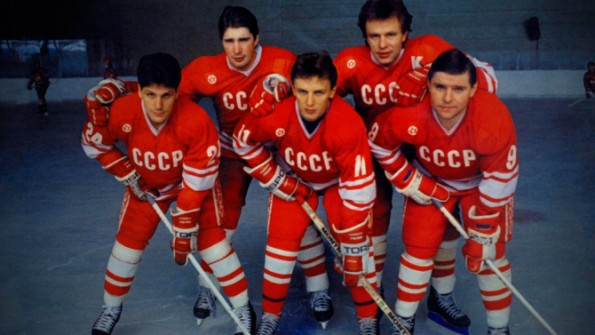Red Army (Polsky, 2014)
Red Army, in sharing the history of the Soviet Union’s premier hockey team, won’t make you nostalgic for the Cold War, but will stir up strong memories. Readers and viewers who remember the collapse of the Berlin Wall will just as easily recall how the Olympics functioned as a quadrennial East/West showdown. Perhaps no sporting event embodied this more powerfully than the faceoff between the American and Soviet hockey teams at Lake Placid in 1980.
Time not only heals all wounds but sands away old antipathies. Watching Red Army, I smiled during Soviet hockey victories and empathized with their defeats.
Young director Gabe Polsky (this is only his second feature) has a fine story on his hands, and he tells it superbly. By anchoring his narrative in the life of one particular athlete, Slava Fetisov, we never lose sight of the personal. Without spoiling too much for the hockey-naïve, we follow Fetisov from his childhood tryouts for the Red Army squad in the ‘60’s, though his central role on their legendary teams of the ‘80’s and beyond.
Polsky situates Fetisov’s maturation in the bigger picture surrounding him. We learn how Josef Stalin prompted the team’s founding, how even the Politburo viewed this branch of the Soviet army as a crucial propaganda tool, and how Leonid Brezhnev’s displeasure with its genius coach led to his replacement with a widely despised KGB pet.

Just as skillfully, the camera is pulled back further to show us the evolution of Russian society from Fetisov’s youth into his middle adulthood. While the entire nation struggled with the implications of Gorbachev’s glasnost and perestroika, we witness this trickle down into vocational confusion for Fetisov and his teammates.
Polsky even manages to serve up the contrasting styles of hockey played in the USSR and in the NHL. Especially as taught by Anatoli Tarasov, “the father of Russian hockey,” the sport was beautifully choreographed, with movement and play inspired by (I kid you not) ballet and chess. Ample video clips of such poetry on ice left me gasping in appreciative wonderment.
Utterly different was the type of hockey executed on American and Canadian rinks. By comparison, NHL players were soloists scheming for their own breaks to score a goal, smashing and punching opponents in their way. Even “The Great One,” Wayne Gretzky, makes a brief appearance to comment on his befuddlement by Soviet strategy.
Of course, it’s impossible to resist forming broader cultural analogies about Eastern communal life versus Western individualism. To Polsky’s credit, neither perspective is idealized or devalued, with plenty of warts and beauty marks to go around on both sides.
For a sophomore directing effort, Polsky displays a remarkable ability to edit together a gripping story. Digging into numerous media archives for footage of Communist-era homes, May Day marches, and, naturally, hockey games and practices, we are offered a lively impression of each passing decade.
(An atheist sidebar: I couldn’t help but feel amusement at an excerpt from a speech by President Jimmy Carter, disparaging Soviet leadership by labeling them as “atheistic.” How times have changed, as our current president goes out of his way to note that American citizens possessing no religion are equal in citizenry to their believing counterparts.)
Anyway, back to Red Army: Polsky blends his discerningly chosen footage with illuminating contemporary interviews with Fetisov, his fellow players, sports journalists, and even a former KGB agent. This deft admixture reminded me of the work of two venerated masters of the documentary genre, Errol Morris and Werner Herzog.

The snippets of Polsky’s questioning that we hear during the course of Red Army are more akin to semi-articulate mumblecore than Morris’ politely confrontational queries (as seen in The Fog of War and The Unknown Known). However, Polsky still displays a hint of the latter’s ability during interviews to elicit from subjects psychological insights of which even they don’t appear to be yet aware.
Herzog’s influence emerges in Polsky’s tendency to start and stop the camera long before and after your standard talking head feature. This results in occasional dissonant hilarity, as when our retired KGB functionary is interrupted and harangued by his imperious granddaughter.
I liked, too, how the gravity of Red Army’s subject matter is offset by a spirit of playfulness. This is immensely aided by a peppy score whose melodies and instrumentation could’ve blown their way across the Caucasus Mountains. Little touches make a difference, too: when Soviet schoolchildren solemnly sing that “cowards shouldn’t play hockey,” the subtitled lyrics are emphasized by a bouncing hammer and sickle icon.
My sole criticism of this film – and it’s a small one – is that the early segments of Red Army are sometimes hyperkinetically overstimulating. Nonetheless, this is a film to be savored alike by ESPN fanatics and by those who couldn’t differentiate between a Red Wings goalie and a Red Sox catcher. From the clever microfilm-esque opening images to the closing credits, I sat transfixed by the craft of a master storyteller and editor.
4.5 out of 5 stars
(Parents’ guide: Despite a PG rating for “thematic material and language,” this is suitable fare for nearly all ages.)

